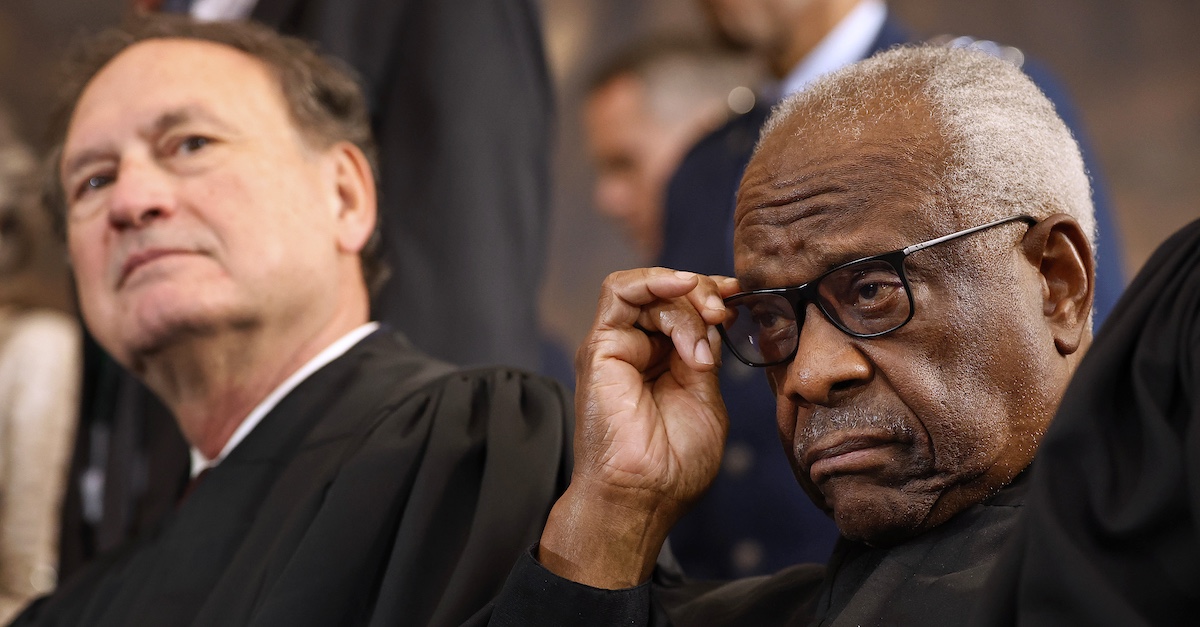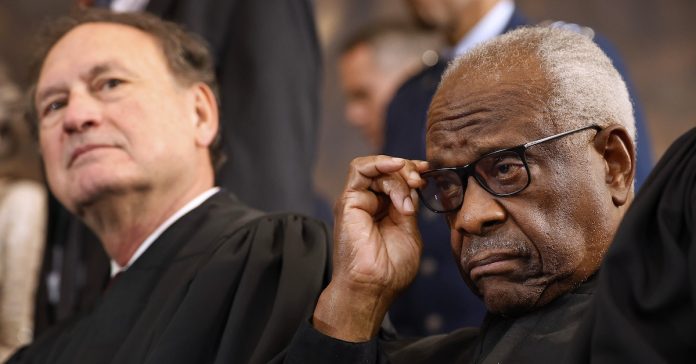
Supreme Court Justices Samuel Alito, left, and Clarence Thomas look on during the 60th Presidential Inauguration in the Rotunda of the U.S. Capitol in Washington, Monday, Jan. 20, 2025. (Chip Somodevilla/Pool Photo via AP).
As the U.S. Supreme Court declined to hear a Colorado case on the rights of parents to “direct the care, custody, and control of their children,” three conservative justices agreed with the denial but nonetheless expressed concern about allegations of public schools encouraging or assisting a minor”s gender transition “without parental knowledge.”
In Jonathan Lee, et al. v. Poudre School District R-1, the petitioners — two sets of parents and two minor children — asked the high court in July to answer the question of whether a “school district may discard the presumption that fit parents act in the best interests of their children” and place itself in that role.
In a brief statement attached to SCOTUS’ Tuesday orders list, Justice Samuel Alito led the charge, joined by Justices Clarence Thomas and Neil Gorsuch, in encouraging lower courts to confront a “particularly contentious constitutional questio[n]” on parental rights, even as Alito and his colleagues ultimately agreed not to take up this particular 10th Circuit U.S. Court of Appeals case at this time.
Months after Alito wrote the majority opinion siding with parents who wished to opt their children out of “LGBTQ+-inclusive” book-reading at public schools in Montgomery County, Maryland, the justice said the Lee petitioners failed to secure a writ of certiorari because they did not “challenge the ground for the ruling below.”
Love true crime? Sign up for our newsletter, The Law&Crime Docket, to get the latest real-life crime stories delivered right to your inbox
The 10th Circuit had ruled the parents didn’t “explain how policies that presume the district knows better than parents, or that discourage disclosure, directly caused district staff” to act in various ways, including:
• recruit students to attend GSA [Gender and Sexuality Alliance] meetings (including by misleading one student to coax her attendance),
• present dubious information to students about being transgender and about suicide,
• award prizes to students if they identify as transgender at the meeting,
• offer the staffs’ personal contact information to students so they could talk any time, and
• tell students that they didn’t have to tell their parents about what happened at the meeting, and that it might be unsafe to talk with their parents about gender-identity issues.
Alito, not moved to act at this time, nonetheless said he was “concerned,” both about the issues and how “some” federal courts have been “tempt[ed]” not to address “whether a school district violates parents’ fundamental rights ‘when, without parental knowledge or consent, it encourages a student to transition to a new gender or assists in that process.'”
“Petitioners tell us that nearly 6,000 public schools have policies — as respondent allegedly does — that purposefully interfere with parents’ access to critical information about their children’s gender-identity choices and school personnel’s involvement in and influence on those choices,” the justice wrote. “The troubling — and tragic — allegations in this case underscore the ‘great and growing national importance’ of the question that these parent petitioners present.”
The rejected case was brought by America First Legal, a law firm co-founded by Trump White House deputy chief of staff Stephen Miller.

